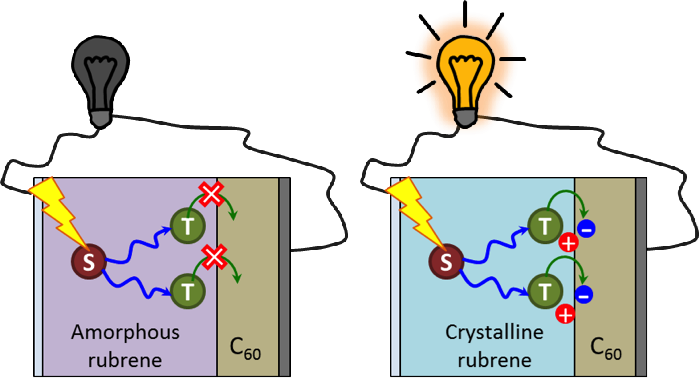One makes two: collecting triplet excitons in organic solar cells
Effective organic solar cells rely on the ability to split photogenerated electron-hole pairs (so‑called excitons) at the interface between donor- and acceptor-type materials. Some organic materials exhibit efficient singlet fission, or singlet-to-two-triplets conversion, leading to the possibility of higher efficiencies than would otherwise be possible. Therefore, materials and methods are needed to utilize triplet excitons via their direct dissociation to charges at the interface.

The Optical Condensed Matter Physics group (the Zernike Institute for Advanced Materials), together with colleagues from Princeton University (USA) have demonstrated that triplet exciton harvesting in rubrene/C60 bilayer solar cells can be dramatically enhanced by tuning the morphology of the rubrene layer. Using a combination of time-resolved photoluminescence quenching technique, external quantum efficiency measurements and photoelectron spectroscopy they have shown that in amorphous rubrene/C60 system triplet harvesting is blocked, while after rubrene crystallization it becomes extremely efficient. The results obtained demonstrate the possibility of creating organic solar cells with quantum efficiency exceeding 100%.
The results of this work are published in Advanced Functional Materials: YunHui L. Lin, Michael A. Fusella, Oleg V. Kozlov, Xin Lin, Antoine Kahn, Maxim S. Pshenichnikov and Barry P. Rand, “Morphological Tuning of the Energetics in Singlet Fission Organic Solar Cells”
| Last modified: | 07 July 2016 1.22 p.m. |
More news
-
16 April 2024
UG signs Barcelona Declaration on Open Research Information
In a significant stride toward advancing responsible research assessment and open science, the University of Groningen has officially signed the Barcelona Declaration on Open Research Information.
-
02 April 2024
Flying on wood dust
Every two weeks, UG Makers puts the spotlight on a researcher who has created something tangible, ranging from homemade measuring equipment for academic research to small or larger products that can change our daily lives. That is how UG...
-
18 March 2024
VentureLab North helps researchers to develop succesful startups
It has happened to many researchers. While working, you suddenly ask yourself: would this not be incredibly useful for people outside of my own research discipline? There are many ways to share the results of your research. For example, think of a...
